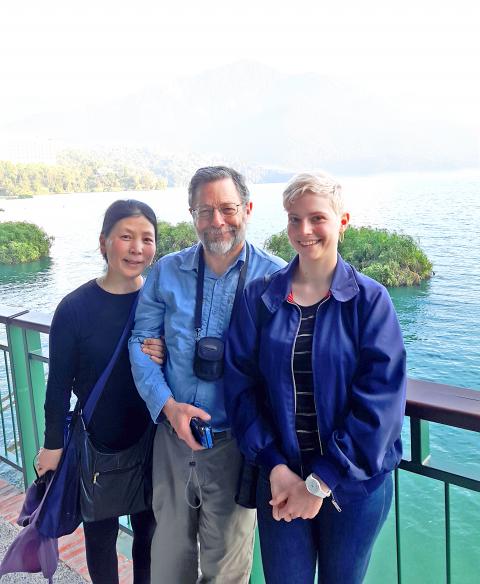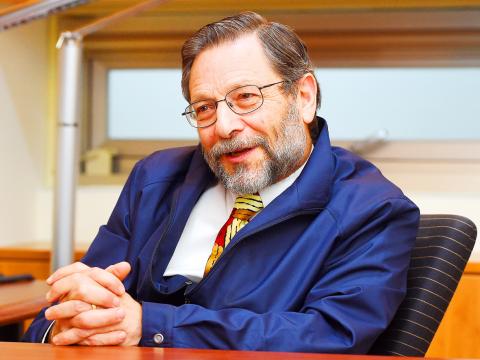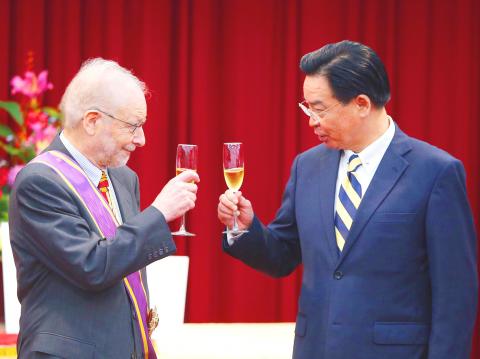J. Bruce Jacobs, the American-born Australian academic who was a giant of Taiwan scholarship, recipient of top civilian awards from the Taiwanese and Australian governments and a regular Taipei Times contributor, died yesterday afternoon in Melbourne after a years-long battle with cancer, a friend of the family told the newspaper.
The 76-year-old Jacobs first came to Taiwan in 1965 as a postgraduate student in history at National Taiwan University after earning his bachelor’s degree from Columbia University. He returned to Columbia in 1966 to pursue a master’s degree, which was awarded in 1970, and then returned to Taiwan in 1971 to conduct research for his doctorate, staying until 1973.
After earning his doctorate from Columbia in 1975, Jacobs in 1976 became a lecturer in politics at La Trobe University in Melbourne, going on to become chair in Asian studies in 1988 and founding director of its Institute of Asian Studies the following year.

Photo courtesy of Martin Williams
He also taught at Nanjing University in the late 1980s.
In 1991, he was hired by Monash University as a professor of Asian languages and studies, and over the years held several leadership positions in that department, including as director of its Taiwan Research Unit.
In 2014, he became emeritus professor of Asian languages and studies at the university.

Photo: Liao Chen-huei, Taipei Times
In addition to his research and writings on Taiwan and China, Jacobs earned his own footnote in Taiwanese history after the Feb. 28, 1980, murders of the mother and twin daughters of then-jailed provincial assemblyman Lin I-hsiung (林義雄) and the attempted murder of his third daughter, while Lin was jailed awaiting trial on charges of insurrection for helping organizing the Dec. 10, 1979, demonstration against the then-Chinese Nationalist Party (KMT) government, an event that became known as the Kaohsiung Incident.
Jacobs was a friend of the family and although Lin’s home in Taipei was under 24-hour surveillance, the government accused Jacobs of being involved in the murders and he was placed under “police protection” for three months and barred from leaving Taiwan.
After he was allowed to return to Australia, he was placed on the KMT government’s blacklist and barred from returning to Taiwan for 12 years.

Photo: CNA
Jacobs wrote about the experience in his 2016 book, The Kaohsiung Incident in Taiwan and Memoirs of a Foreign Big Beard, a reference to his local nickname, “Big Beard.”
On Nov. 16 last year, Minister of Foreign Affairs Joseph Wu (吳釗燮) awarded Jacobs the Order of Brilliant Star with Grand Cordon at a ceremony at the Ministry of Foreign Affairs in Taipei in recognition of his contributions to democratization and human rights in Taiwan.
Wu said that Jacobs had not only made “exceptional contributions to the people of Taiwan,” but was also “part of Taiwan’s history.”
On June 10, Jacobs was made a Member of the Order of Australia for his significant service to higher education, particularly in the field of Asian studies.
Jacobs’ wife, Kim Jung-sim, and his daughters Melanie, Ruth and Stephanie, were with him when he died at the family home, the Taipei Times’ source said.

INVESTIGATION: The case is the latest instance of a DPP figure being implicated in an espionage network accused of allegedly leaking information to Chinese intelligence Democratic Progressive Party (DPP) member Ho Jen-chieh (何仁傑) was detained and held incommunicado yesterday on suspicion of spying for China during his tenure as assistant to then-minister of foreign affairs Joseph Wu (吳釗燮). The Taipei District Prosecutors’ Office said Ho was implicated during its investigation into alleged spying activities by former Presidential Office consultant Wu Shang-yu (吳尚雨). Prosecutors said there is reason to believe Ho breached the National Security Act (國家安全法) by leaking classified Ministry of Foreign Affairs information to Chinese intelligence. Following interrogation, prosecutors petitioned the Taipei District Court to detain Ho, citing concerns over potential collusion or tampering of evidence. The

‘FORM OF PROTEST’: The German Institute Taipei said it was ‘shocked’ to see Nazi symbolism used in connection with political aims as it condemned the incident Sung Chien-liang (宋建樑), who led efforts to recall Democratic Progressive Party (DPP) Legislator Lee Kun-cheng (李坤城), was released on bail of NT$80,000 yesterday amid an outcry over a Nazi armband he wore to questioning the night before. Sung arrived at the New Taipei City District Prosecutors’ Office for questioning in a recall petition forgery case on Tuesday night wearing a red armband bearing a swastika, carrying a copy of Adolf Hitler’s Mein Kampf and giving a Nazi salute. Sung left the building at 1:15am without the armband and apparently covering the book with a coat. This is a serious international scandal and Chinese

Seventy percent of middle and elementary schools now conduct English classes entirely in English, the Ministry of Education said, as it encourages schools nationwide to adopt this practice Minister of Education (MOE) Cheng Ying-yao (鄭英耀) is scheduled to present a report on the government’s bilingual education policy to the Legislative Yuan’s Education and Culture Committee today. The report would outline strategies aimed at expanding access to education, reducing regional disparities and improving talent cultivation. Implementation of bilingual education policies has varied across local governments, occasionally drawing public criticism. For example, some schools have required teachers of non-English subjects to pass English proficiency

TRADE: The premier pledged safeguards on ‘Made in Taiwan’ labeling, anti-dumping measures and stricter export controls to strengthen its position in trade talks Products labeled “made in Taiwan” must be genuinely made in Taiwan, Premier Cho Jung-tai (卓榮泰) said yesterday, vowing to enforce strict safeguards against “origin laundering” and initiate anti-dumping investigations to prevent China dumping its products in Taiwan. Cho made the remarks in a discussion session with representatives from industries in Kaohsiung. In response to the US government’s recent announcement of “reciprocal” tariffs on its trading partners, President William Lai (賴清德) and Cho last week began a series of consultations with industry leaders nationwide to gather feedback and address concerns. Taiwanese and US officials held a videoconference on Friday evening to discuss the